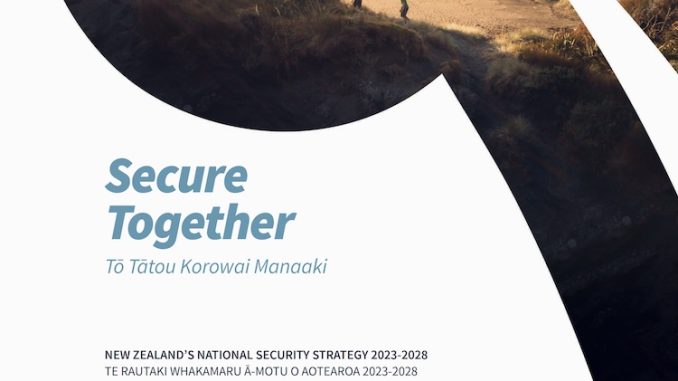
The New Zealand Government has today released the first two documents of its Defence Policy Review in addition to New Zealand’s long-awaited first-ever National Security Strategy.
Prime Minister Chris Hipkins and Defence Minister Andrew Little have today launched New Zealand’s inaugural National Security Strategy along with its latest Defence Policy Review.
National Security Strategy
The National Security Strategy, Secure Together – Tō Tātou Korowai Manaaki, has been published as the government’s direction to its national security agencies on how to navigate the changed environment, and is accompanied by an updated set of National Security and Intelligence Priorities.
“The world today is contending with a range of complex and disruptive security challenges,” Prime Minister and Minister for National Security and Intelligence Chris Hipkins said. “The domestic and international security environment has changed and our preparedness needs to change too – to be clear-eyed on risks and to put in place the right capabilities to be effective.
“As we scan the international horizon, we need to keep our eyes wide open to the emerging issues and threats to New Zealand and our interests. These emerging threats do not require an entirely new foreign policy response. Our independent position, coupled with targeted investments and strengthened ties with partners and allies puts us in a strong position to face the future.
“We take the world as it is, not how we would like it to be. It is essential to respond appropriately to the full range of national security threats to New Zealand and our interests,” Defence Minister Andrew Little said. “That is what forms the assessments and strategies in the documents released today, all of which are tightly aligned and interdependent.
“As we work to safeguard our national security we will be proportionate, predictable and avoid unnecessary securitisation,” Andrew Little said.
Defence Policy Strategy Statement
The Defence Policy Strategy Statement identifies the principal challenges facing New Zealand’s security as climate change and strategic competition. It also lays out the country’s defence objectives, which include:
- A secure, sovereign, resilient New Zealand and region,
- Collective security through a strong network of partners, and
- An effective rules-based international system.
“We will do that by acting early and deliberately in pursuing and protecting our defence interests, particularly in – and for – the Pacific, stated Minister Little. “We will strengthen understanding in and of our region, including by amplifying Pacific voices in the world.”
“We will enhance our many partnerships, particularly with our sole formal military ally, Australia, and the Pacific Islands Countries who are more family than just neighbours.”
Future Forces Design Principles
Included within the new suite of documents includes the Future Forces Design Principles 2023, which bridges the new Defence strategy and the options for the investment required to deliver it. It forms the basis for a new Defence Capability Plan.
The set of documents outlines where government will be focusing the national security effort, including:
- Investing in a combat-capable defence force and the wider national security system;
- Tackling emerging issues such as disinformation, and undertaking more concerted efforts in areas where threats are growing, including economic security;
- “Building and sustaining a public conversation on national security,” by being more upfront to the public about what the government is observing as well as listening to New Zealanders, in order to grow and maintain social license for efforts to protect security;
- Supporting Pacific resilience, providing development assistance, and continuing work to bolster the security capacity of Pacific nations;
- Strengthening security cooperation and ties in the broader Indo-Pacific region; and
- Working to maintain and strengthen the global system of rules and norms;
- Commencing work on a new Defence Capability Plan that will outline what resources, people and capability, are required to meet future challenges.
The updated National Security and Intelligence Priorities are:
- Strategic competition and the rules-based international system,
- Emerging, critical and sensitive technologies,
- Disinformation,
- Foreign interference and espionage,
- Terrorism and violent extremism,
- Transnational organised crime,
- Pacific resilience and security, and
- Economic, maritime, border, cyber and space security.
More in-depth coverage of the new defence and national security documents to come in Line of Defence Magazine and www.defsec.net.nz.





